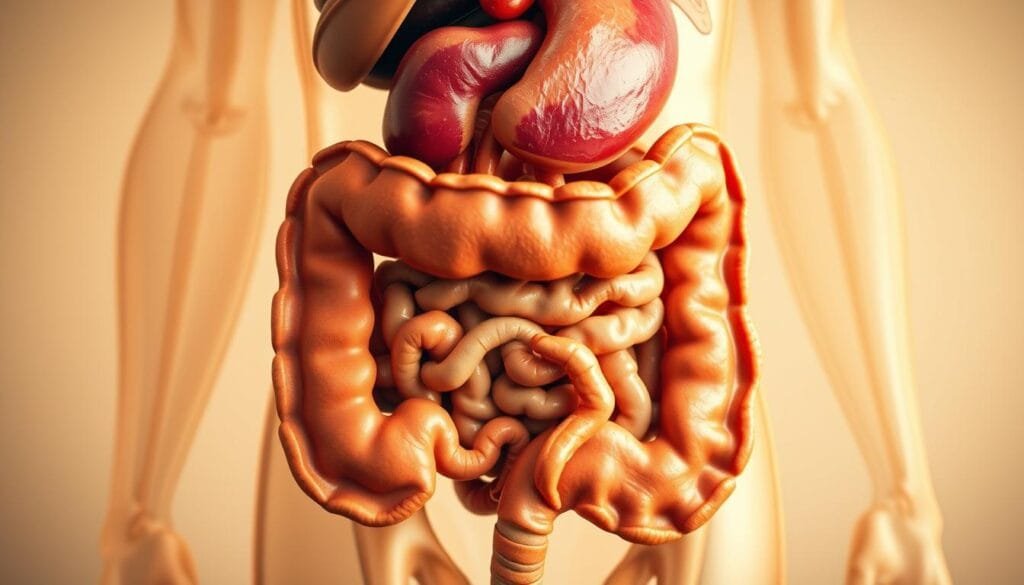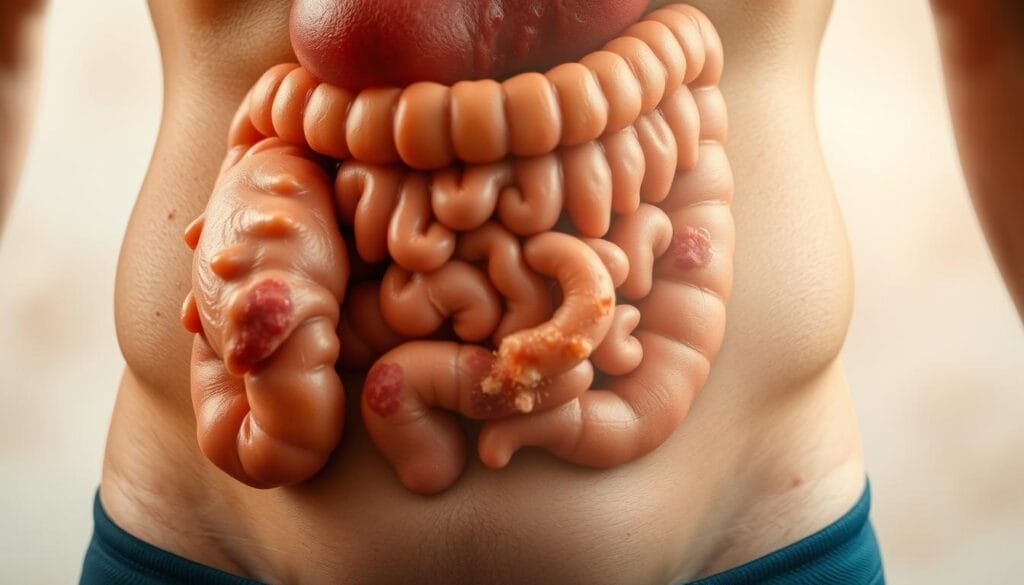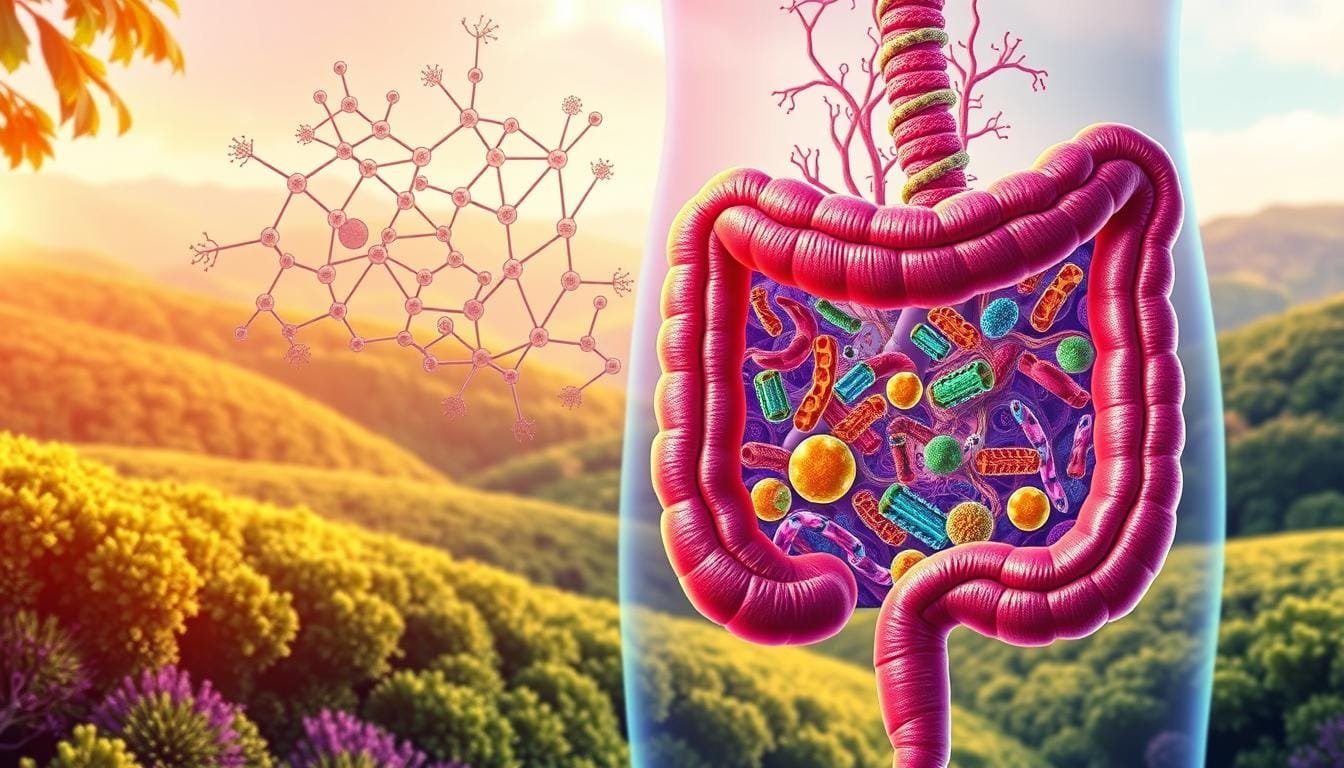Currently Empty: RM0.00
A balanced digestive system does more than process food—it powers immunity, mood, and energy levels. Wellness Concept specializes in helping Malaysians unlock these benefits through personalized gut health strategies. From spicy local dishes to modern stressors, daily habits shape microbiome diversity.
Research links a healthy gut to reduced inflammation and sharper mental clarity. The team at Wellness Concept offers science-backed guidance, available via WhatsApp (+60123822655) during business hours (Mon-Fri 9:30am-6:30pm, Sat-Sun 10am-5pm).
Key Takeaways
- Digestive balance influences immunity and emotional well-being
- Local diets impact microbiome composition uniquely
- Expert consultations adapt global science to Malaysian lifestyles
- Preventive care reduces long-term chronic disease risks
- Small dietary shifts create measurable improvements
Introduction to Gut Health
Trillions of microorganisms work together in the digestive tract, forming a complex ecosystem. This community, known as the gut microbiome, includes bacteria, viruses, and fungi. It weighs 2–5 pounds—similar to the human brain.
Nearly 40 trillion bacterial cells reside here, outnumbering human cells. These microbes break down food, synthesize vitamins, and communicate with the immune system. In fact, 70% of immune tissue lives in the intestines.
| Feature | Gut Microbiome | Human Brain |
|---|---|---|
| Weight | 2–5 lbs | 2–4 lbs |
| Cell Count | ~40 trillion | ~86 billion |
Urban lifestyles in Malaysia threaten this balance. Processed foods, stress, and erratic meals reduce microbial diversity. Spicy local dishes, while flavorful, may irritate sensitive digestive systems.
Wellness Concept tailors solutions for these challenges. Their experts blend science with cultural dietary habits. For personalized advice, contact them at +60123822655.
What Is the Gut Microbiome?
Bacteria, viruses, and fungi form a hidden universe inside every person. This dynamic community, known as the gut microbiome, collaborates to digest food, fight pathogens, and even regulate mood. Over 1,000 species thrive here, each playing a specialized role.
Microbial Teamwork in Digestion
Bacteria dominate the microbiome, breaking down fiber into short-chain fatty acids that fuel intestinal cells. Viruses often target harmful bacteria, while fungi assist in metabolizing complex carbs. Together, they:
- Produce serotonin (90% of this “happy hormone” originates in the gut)
- Synthesize vitamins B and K
- Train the immune system to distinguish threats from harmless substances
| Microorganism | Primary Role | Impact |
|---|---|---|
| Bacteria (e.g., Bifidobacteria) | Fiber digestion | Reduces inflammation |
| Viruses (bacteriophages) | Control bacterial populations | Prevents infections |
| Fungi (e.g., Saccharomyces) | Carb metabolism | Supports nutrient absorption |
From Birth to Adulthood: Building Diversity
Vaginal deliveries expose infants to maternal bacteria, while C-section babies miss this critical transfer. Breastfeeding further enriches Bifidobacteria, which digest milk sugars and block harmful microbes.
Malaysian diets, rich in turmeric, coconut, and fermented foods like tempeh, naturally boost microbial variety. Regular consumption of local fruits (durian, mangosteen) adds prebiotic fiber to feed beneficial microbes.
Why Is Gut Health Important for Your Body?
A thriving microbiome doesn’t just aid digestion—it shapes overall well-being in surprising ways. From extracting nutrients to defending against infections, these microscopic allies work tirelessly.

Digestion and Nutrient Absorption
Beneficial bacteria break down complex carbs and fibers that human enzymes can’t process. This fermentation produces short-chain fatty acids, which:
- Fuel intestinal cells, strengthening the gut lining
- Synthesize vitamins B and K, crucial for energy and blood health
- Enhance mineral absorption (iron, calcium, magnesium)
Immune System Support
Nearly 70% of the immune system resides in the gut. A diverse microbiome trains immune cells to recognize threats while tolerating harmless substances. Dysbiosis (microbial imbalance) may trigger:
- Leaky gut syndrome, allowing toxins into the bloodstream
- Autoimmune reactions like rheumatoid arthritis
- Chronic inflammation linked to heart disease
Mental Health and Brain Function
The gut produces 90% of serotonin, a neurotransmitter regulating mood. Studies connect poor microbial diversity to higher risks of depression and anxiety. The gut-brain axis works via:
- Vagus nerve signaling (direct communication to the brain)
- Inflammation markers affecting cognitive function
- Metabolites influencing memory and focus
Wellness Concept’s probiotic guides help restore this balance. For personalized advice, message them at +60123822655.
The Link Between Gut Health and Weight Management
Weight management isn’t just about calories—it’s deeply connected to the trillions of microbes in your intestines. Studies show that identical diets affect people differently based on their microbiome composition. Mice transplanted with obese-type bacteria gained 20% more weight, even eating the same food as lean mice.
Two key bacterial groups influence weight:
| Bacterial Group | Role | Impact |
|---|---|---|
| Firmicutes | Extract calories efficiently | Higher ratios linked to obesity |
| Bacteroidetes | Regulate fat storage | Lower ratios correlate with weight gain |
Malaysia’s shift toward processed foods has disrupted this balance. Traditional dishes like ulam (herbal salads) and fermented tempeh support bacteria diversity, but fast-food culture promotes Firmicutes dominance. Obesity rates have doubled since 2011, mirroring these dietary changes.
Fiber-rich foods act as a reset button. They feed beneficial microbes, reduce inflammation, and increase satiety hormones. Probiotics—like those in kimchi or yogurt—may also aid modest weight loss by improving microbial balance.
Wellness Concept designs personalized diet plans to address these imbalances. Their experts analyze lifestyle factors and local food preferences. For a tailored approach, contact them at +60123822655.
Gut Health and Chronic Diseases
Research reveals strong connections between microbial balance and long-term disease risks. When harmful bacteria outnumber beneficial ones, inflammation rises, triggering conditions like inflammatory bowel disease (IBD) and diabetes. Malaysians face growing disease burdens, making proactive care essential.
Inflammatory Bowel Disease and IBS
Dysbiosis—a microbial imbalance—often underlies IBD and IBS. Symptoms like bloating and cramps signal intestinal permeability, where toxins leak into the bloodstream. Key triggers include:
- Low-fiber diets, common in urban Malaysian lifestyles
- Chronic stress, disrupting gut-brain communication
- Overuse of antibiotics, wiping out protective bacteria
Heart Health and Cholesterol
Gut microbes process red meat into TMAO, a compound that hardens arteries. High TMAO levels increase cardiovascular risk by 62%. To protect heart health:
- Limit processed meats (common in local nasi lemak toppings)
- Increase omega-3s from fish like kembong (mackerel)
- Consume prebiotic garlic and onions daily
Diabetes and Blood Sugar Control
Imbalanced microbiomes precede type 1 diabetes and worsen insulin resistance. Beneficial bacteria improve blood sugar metabolism by:
- Producing short-chain fatty acids that reduce inflammation
- Enhancing insulin sensitivity by up to 30%
- Breaking down complex carbs slowly, preventing spikes
With Malaysia’s diabetes rates doubling since 2011, microbiome testing offers early warnings. Wellness Concept provides tailored screenings—call +60123822655 to schedule.
Signs of an Unhealthy Gut
Your body sends clear signals when digestive balance falters—recognizing them early prevents long-term issues. Persistent symptoms often indicate microbial imbalance, requiring prompt attention.

- Bloating or gas lasting over 48 hours after meals
- Chronic constipation or diarrhea (fewer than 3 bowel movements weekly)
- Sudden food intolerances, especially to gluten or dairy
- Unintended weight fluctuations (±5% without diet changes)
| Symptom | Possible Cause | Action Step |
|---|---|---|
| Frequent infections | Weakened gut-mediated immunity | Increase probiotic-rich foods (kimchi, yogurt) |
| Eczema/acne flare-ups | Leaky gut releasing toxins | Reduce sugar and processed oils |
| Blood in stool | Colorectal concerns | Seek immediate medical evaluation |
Ignoring these signs risks escalating inflammation or nutrient deficiencies. Wellness Concept’s team deciphers symptoms with tailored testing—message them at +60123822655 for a gut-balancing plan.
How to Improve Your Gut Health Naturally
Small daily choices can transform your digestive ecosystem more than you realize. Simple shifts in meals, movement, and mindset create lasting microbial balance. Wellness Concept’s experts tailor these strategies to Malaysia’s food culture and lifestyle rhythms.
Dietary Changes for a Healthy Gut
Fiber-rich foods like legumes and whole grains fuel beneficial bacteria. Local options—papaya, oats, and banana—are packed with prebiotics. These compounds feed probiotics, strengthening the gut lining.
Colorful vegetables add polyphenols, which reduce inflammation. Try incorporating:
- Ulam herbs (daun kaduk, pegaga) for antioxidants
- Fermented foods like tempeh or kimchi for live cultures
- Turmeric-infused dishes to soothe digestion
The Role of Probiotics and Prebiotics
Probiotics (live bacteria) and prebiotics (their food) work synergistically. Yogurt and kefir introduce helpful strains, while garlic and onions provide nourishment. Studies show this combo boosts microbial diversity by 40%.
For targeted support, supplements like Bifidobacterium may help. Wellness Concept’s team recommends lab-tested options available via WhatsApp (+60123822655).
Lifestyle Factors: Sleep, Stress, and Exercise
Seven to nine hours of sleep nightly allows gut repair. Poor rest disrupts melatonin production, which regulates intestinal motility.
Stress triggers cortisol spikes, harming microbial balance. Malaysian mindfulness practices—like senam pernafasan (breathwork)—can counteract this. Just 150 minutes of weekly exercise, such as brisk walking, enhances bacterial variety.
Foods to Eat and Avoid for Optimal Gut Health
Your plate holds the power to reshape your digestive ecosystem with every bite. The right choices fuel beneficial bacteria, while poor ones trigger inflammation. Wellness Concept simplifies this with science-backed guidance tailored to Malaysian flavors.
Gut-Friendly Superstars
Prioritize these to nourish microbial allies:
- Fermented foods like yogurt, miso, and tempeh (live cultures boost diversity)
- Ulam herbs (daun kaduk, pegaga)—rich in fiber and antioxidants
- Garlic and onions (prebiotics feed good bacteria)
- Local kembung fish (omega-3s reduce intestinal inflammation)
Foods to Limit or Avoid
These disrupt microbial balance:
- Ultra-processed snacks (emulsifiers harm the gut lining)
- Sugar alcohols (sorbitol, xylitol cause bloating)
- Fried foods (trans fats promote harmful bacteria)
- Excessive red meat (increases TMAO, linked to heart risks)
| Best Choices | Benefits | Alternatives to Avoid |
|---|---|---|
| Brown rice nasi lemak | Fiber feeds healthy gut bacteria | White rice versions (low fiber) |
| Green tea | Polyphenols reduce inflammation | Sugared teh tarik |
| Papaya | Enzymes aid digestion | Canned fruits in syrup |
Sample Day’s Meal Plan
Balancing local favorites with science:
- Breakfast: Oats with papaya and turmeric tea
- Lunch: Brown rice nasi lemak with kembung sambal
- Dinner: Stir-fried ulam with tempeh and garlic
Conclusion
A thriving intestinal ecosystem acts as a silent partner in overall wellness. It supports immunity, weight balance, and mental clarity—proving that good gut care is foundational.
Simple steps make a difference: diversify meals with fiber-rich local foods, manage stress through breathwork, and seek expert guidance. Wellness Concept tailors plans to Malaysian lifestyles, helping clients improve gut resilience sustainably.
Ready to prioritize your health? Message them via WhatsApp at +60123822655 (Sat–Sun 10am–5pm). Your journey to a balanced microbiome starts today!
FAQ
How does the gut microbiome affect digestion?
The gut microbiome helps break down food, absorb nutrients, and produce essential vitamins like B12 and K. A balanced microbiome ensures smooth digestion and prevents issues like bloating or constipation.
Can gut health impact mental well-being?
Yes, research shows a strong gut-brain connection. An unhealthy microbiome may contribute to anxiety, depression, and brain fog due to neurotransmitter imbalances.
What are common signs of poor gut health?
Frequent bloating, gas, diarrhea, constipation, fatigue, and food intolerances often signal an imbalance. Skin conditions like eczema may also be linked to gut issues.
Do probiotics really help improve gut health?
Probiotics from yogurt, kefir, or supplements introduce beneficial bacteria. Studies suggest they support digestion, immunity, and may reduce inflammation in conditions like IBS.
How does diet influence the gut microbiome?
Fiber-rich foods (vegetables, whole grains) feed good bacteria, while processed foods and excess sugar promote harmful microbes. Fermented foods like kimchi add diversity.
Can gut health affect weight management?
An imbalanced microbiome may influence metabolism and fat storage. Some bacteria strains are linked to obesity, while others help regulate blood sugar and appetite.
What lifestyle habits harm gut bacteria?
Chronic stress, lack of sleep, excessive alcohol, and antibiotics disrupt microbial balance. Regular exercise and hydration support a healthier gut environment.
Are there specific foods to avoid for gut health?
Limit artificial sweeteners, fried foods, and refined carbs. These can trigger inflammation and reduce microbial diversity, weakening the intestinal lining.



